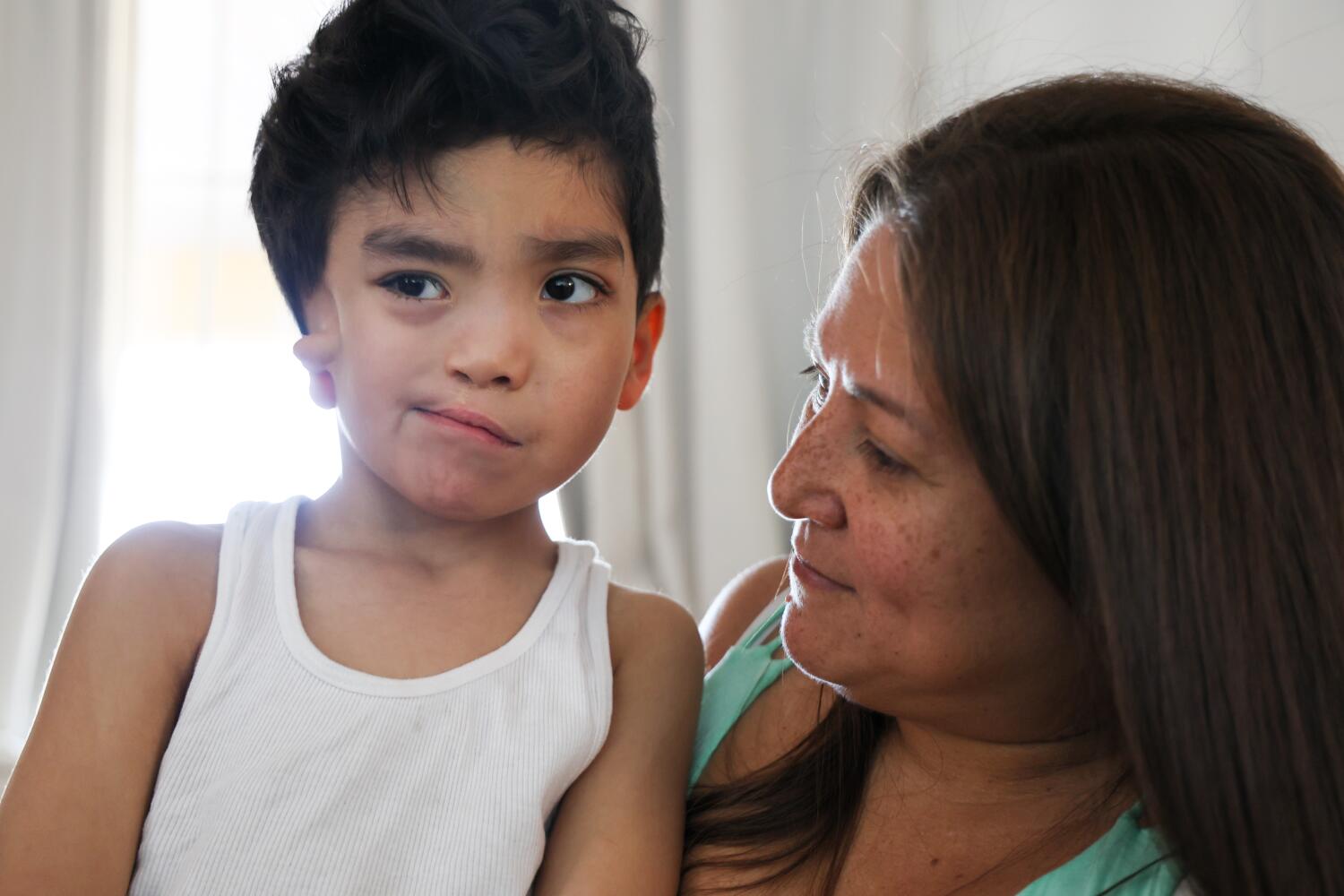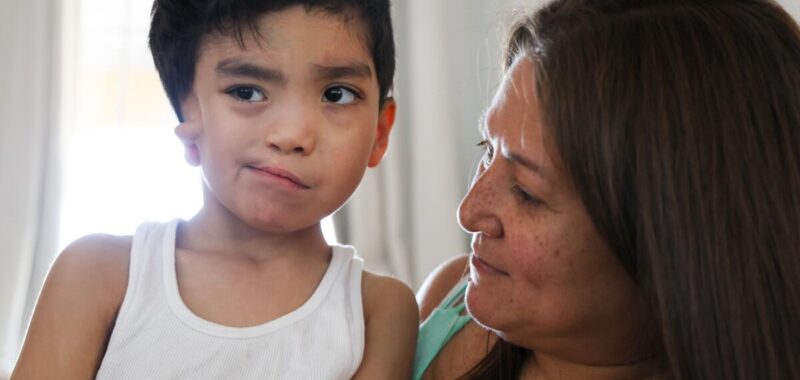
A major initiative at Children’s Hospital Los Angeles aims to address a critical but much overlooked need: mental health care for families experiencing the complex flood of joy, fear and upheaval during the first few years of a child’s life.
Myriad issues can emerge or become exacerbated in a family after a baby is born, including maternal postpartum depression, sleep problems, attachment issues between caregivers and children, early signs of behavioral challenges, domestic conflict between parents, and housing insecurity that often worsens as a family grows. If a child also experiences a medical issue, including an extended hospital stay, a serious birth defect or a developmental delay, these problems can be compounded.
A $25-million gift from the Tikun Olam Foundation of the Jewish Community Foundation of Los Angeles will allow the hospital to expand mental health screening and services to as many as 30,000 children ages 3 and under who seek care at Children’s Hospital each year, making it one of the first hospitals in the country to provide universal infant-family mental health services. Currently, the hospital provides these services to about 1,800 children each year.
The idea behind the program is to provide attention and care that can strengthen the bond between parents and children during the baby’s crucial early years — and help prevent problems from spiraling in the longer term.
These bonds are essential to a baby’s healthy brain development in a period of rapid neuron formation and great sensitivity, said Melissa Carson, a pediatric psychologist at the hospital and co-director of the Early Connections Program.
Medical issues and family stressors — also called adverse childhood experiences — can disturb this process, but often aren’t identified until preschool or later, when behavioral or other problems have spiraled.
“Just a little support at a critical moment can really prevent the need for much more intensive service later,” said pediatric psychologist Marian Williams, the program’s co-director.
Children’s Hospital Los Angeles has been offering mental health screening and services to the sickest young children who pass through its neonatal intensive care unit for about 10 year. That program was also funded by Mindy and Gene Stein, whose Tikun Olam Foundation focuses on early childhood.
The demand became evident when the hospital found that many families that were offered mental health support in the neonatal intensive care unit stuck with the services after leaving the hospital. Soon, other departments, such as the cardiac unit, were requesting similar services for their patients as well.
“I hope this becomes something that everybody understands and looks at as a crucial part of a child’s development,” Mindy Stein said.
A ‘window’ of opportunity in early childhood
The hospital will also use the funds to train providers in infant and family mental health care and research the effectiveness of the program in the hopes that the model will spread to other hospitals.
“We have this kind of window when you have a new baby. And there’s also a window when you have a medical need,” Williams said. “There’s probably a lot of parents who will say, ‘I don’t really need you. I’m here because of a cut finger, and we’re fine.’ But I imagine there’s going to be a lot more who say, ‘Oh, wow. Since you asked … .’”
Many families probably could benefit from a handout or video about a common early childhood problem such as sleep issues, picky eating or excessive crying. Some might want to join a parent group with others facing similar challenges, or benefit from a few home visits from a nurse who can help them adjust to life with a new baby.
But other families may need more intensive assistance, such as longer-term therapy. The hospital will also screen them for needed social supports such as housing, food, transportation and internet access, — the lack of which can contribute to a family’s stress and a child’s long-term mental health challenges.
What is infant-family mental health?
The term “infant mental health” can be confusing. After all, it’s difficult to believe that a baby could already be experiencing emotional difficulties. But mental health care in the early years is laser-focused on supporting the developing relationship between the caregiver and child, which can set the trajectory of a child’s life.
For an infant, a therapist might work with the parent to help them notice their baby’s cues, find activities to help the baby explore their environment, and work on their own emotional regulation. As a baby gets older, the therapist also uses play to help develop the bond and begin to treat the child more directly.
For families in the midst of a medical crisis, these early days and months can be particularly fraught, said Patricia Lakatos, a psychologist at the hospital who works with families of children who have been treated in the intensive care unit.
In the neonatal intensive care unit, parents are not only dealing with the day-to-day medical reality, but they’re also “grieving the imagined baby — the baby you thought you were going to have,” Lakatos said. Her work is to visit the family regularly during their stay to help the parent work through their grief and understand how their baby communicates.
Stressful experiences can also affect the baby’s well-being. A baby with traumatic medical needs, for example, may panic every time an adult tries to touch them.
Lakatos said she can read the signs of a struggling newborn in their eyes. Healthy babies, she said, “have a bright, shiny look that tells you, ‘I’m ready. I’m here. I’m curious and want to engage with the world.’” But babies who experience distress often have a “dull, glazed look in their eye. You might try to engage them, and they’re really not engaging with you.”
Others have eyes that are “wide open, almost like hyperalert,” she said. They’re easily startled and may arch their back and splay their hands, as if to say, “The world is stressful for me.”
But having a nurturing, supportive relationship with a caregiver helps buffer that stress. Supporting this bond includes helping the parent notice the signs that the baby is ready to engage — even momentarily — or whether the baby’s cues are telling them they need to “soften my voice or just hold them and not try to look at them because that’s too much stimulation.” The ultimate goal is to help the caregiver find the joy and delight in the baby they have.
A lifeline of support for mother and baby
Stephanie Blanco of Mission Hills first learned she would be having a baby with major medical complications during an ultrasound early in her pregnancy. “I didn’t think I was going to be able to handle it, going through that,” she said.
But right away, she was referred to Children’s Hospital’s Fetal-Maternal Center, which specializes in pregnancies with complex medical conditions, where she met Lakatos. Her son, Vicente Giron Sarria, had been diagnosed with facial deformities, and Lakatos began joining Blanco and her partner at every meeting with the craniofacial team.
“They would explain [the problems] to me, but you would go through so many emotions in that moment. So she would tell me, ‘It’s OK, I’m here,’” and ask her how she was feeling. It was a moment of great tension and stress with her son’s father as they navigated what their new life would look like. She wasn’t sure they would make it as a couple. But Lakatos helped them process their feelings together, she said, and learn to communicate about the their son’s health.
Vinny was born with numerous complications even beyond the predicted facial abnormalities, including the need to eat through a feeding tube, and spent about two months in the intensive care unit, where Lakatos visited the family every other day.
Lakatos taught her breathing exercises, helped her connect with her son and encouraged her to take some time for herself on walks around the hospital campus. Blanco was able to bond with her baby. “You’re thinking, I can deal with this,” she said. “He’s my baby, and we’re going to get through it. The love comes out.”
The challenges didn’t end when Blanco and Vinny finally went home, and neither did Lakatos’s support. Vinny needed several surgeries, and Blanco had to learn how to feed him six times a day — including the middle of the night — through a gastronomy tube.
But Blanco and her partner, Jesse Giron, continued their visits with Lakatos for several more years. Vinny was eventually diagnosed with nonverbal autism and a seizure disorder, and Blanco joined a support group for parents that Lakatos was leading.
Blanco said she is still processing life with a medically complex child who requires constant care at home. “Every day is something new. Every day I learn something. Some days are harder than others.”
But she credits Lakatos and Children’s Hospital Los Angeles with saving her life — and her relationship. “If it wasn’t for them and their kindness, their compassion and their guidance, I would be lost.”
This article is part of The Times’ early childhood education initiative, focusing on the learning and development of California children from birth to age 5. For more information about the initiative and its philanthropic funders, go to latimes.com/earlyed. The Stein Early Childhood Development Fund at the California Community Foundation is among the funders.

